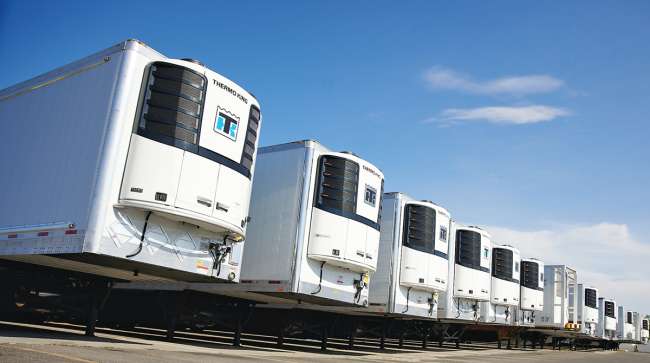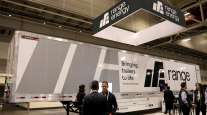Staff Reporter
NACFE: Early Electric TRUs Show Promise; Struggle With Costs

[Stay on top of transportation news: Get TTNews in your inbox.]
The introduction of electric transportation refrigeration units likely will mirror that of battery-electric tractors and trucks, according to a recently released study from the North American Council for Freight Efficiency.
Carriers may see day-to-day operational cost efficiencies from purchasing electric TRUs, but the challenges to widespread adoption are many, including the upfront price tag, the study found.
The research, published Oct. 18, marked NACFE’s first analysis of alternatives available to fleets, with the introduction of all-electric TRUs in its early stages.
“We are at generation zero for some of these technologies,” NACFE Executive Director Mike Roeth told reporters.

Roeth
“It is really early,” said Roeth, adding that emissions from TRUs were only regulated in California.
“The regulatory side of this is real in California, but it is limited elsewhere,” Roeth said. “It’s sort of like a tornado, if it hits you, it’s a big deal, and if you’re not [dealing with the tornado] then it’s not.”
Electrification of TRUs is important, said Rob Graff, NACFE’s senior technical consultant and the study’s lead author, because about one in seven straight trucks and trailers on the road uses a TRU to maintain freight within specified temperature ranges.
NACFE’s study identified four types of TRU power configurations: conventional TRUs; standby electric TRUs; hybrid electric TRUs; and all-electric TRUs, sometimes called battery-electric TRUs.
The three electric TRU configurations can connect to shore power when the vehicle or trailer is parked. This capability can decrease emissions and enable cost savings, NACFE found.

Graff
Shore power will be crucial because refrigerated trucks or trailers spend considerable time idling in yards, Graff told reporters. Additionally, refrigerated truck doors typically remain open for extended periods, he said.
At an Aug. 19 cost of $3.44 per gallon of reefer diesel, and average consumption of 0.75 gallons per hour, the fuel cost for running a reefer is about $2.60 per hour, according to NACFE calculations. Reefer diesel is not the same as regular diesel.
Using the May 2024 average national commercial electricity cost of 12.48 cents per kilowatt-hour, a TRU running on shore power costs about $1.01 per hour — less than 40% of diesel operation costs, saving about $1.60 per hour.
In this scenario, a reefer using shore power rather than diesel for 1,000 hours annually would save $1,670 in fuel costs, NACFE said. The organization considers 1,000 hours — about three to four hours daily — reasonable.
The hours accumulate between pre-cooling in a yard, being parked loaded in a staging area waiting to be unloaded or hauled, or at a truck stop while the driver is resting, NACFE said.
McLeod Software CEO Tom McLeod explores the potential for artificial intelligence to boost efficiency and build resilience. Tune in above or by going to RoadSigns.ttnews.com.
Electric motors, with fewer moving parts than diesel engines, may significantly reduce maintenance costs. TRU supplier Thermo King told NACFE it expects maintenance costs to decrease by one-third.
However, the challenges to introducing electric TRUs are considerable, not unlike the hurdles the considerably more widespread battery-electric trucks and tractors are facing.
Initial costs, as is the case with trucks and tractors so far, significantly surpass those for a diesel equivalent.
Alan Gassler, zero-emission customer sales and operations analyst for PLM Fleet, which rents and leases reefer trailers, told the NACFE study authors that a new diesel 53-foot TRU reefer trailer costs around $110,000 to $115,000. A new standby-electric electric TRU reefer trailer costs about $130,000 to $145,000. An all-electric TRU reefer trailer costs about $170,000 to $250,000.
Carriers will also have to invest in charging infrastructure.
Rightsizing the battery will be the next challenge, said NACFE, noting that too large a battery adds unnecessary capital cost and weight, while an undersized option may fail to support the TRU throughout the duty cycle.
Also, all-electric TRUs carry a weight penalty compared with conventional units due to batteries and power electronics, with significant disagreement about the penalty’s extent, according to the study.
NACFE said the California Air Resources Board estimates a 728-pound penalty for refrigerated trailers, while experts consulted by Graff’s team estimated 2,000 to 2,500 pounds.
Operationally, electric TRU adoption requires close monitoring of battery charge status, greater attention to door closure and seal maintenance, and consistent shore power connection for temperature pulldown at loading docks and in yards, the study said.
Want more news? Listen to today's daily briefing below or go here for more info:





